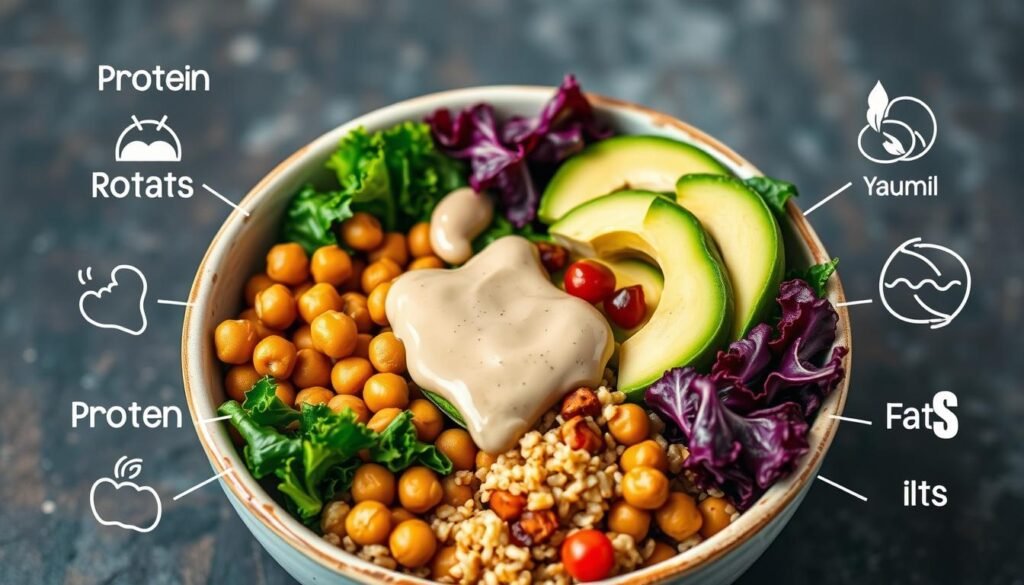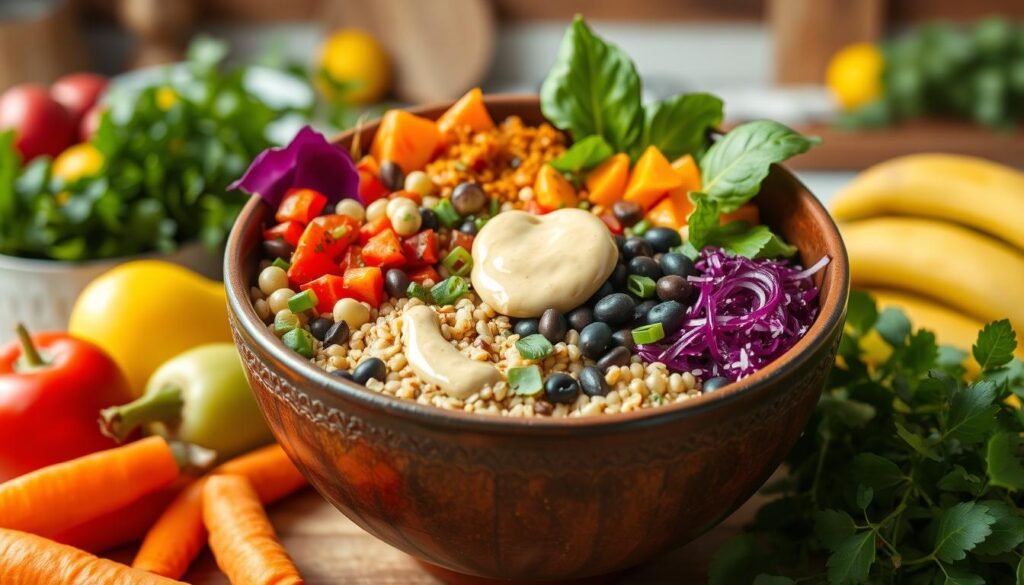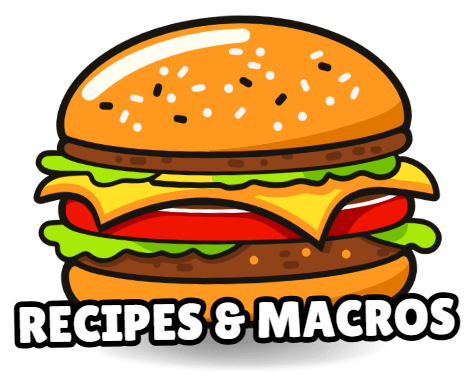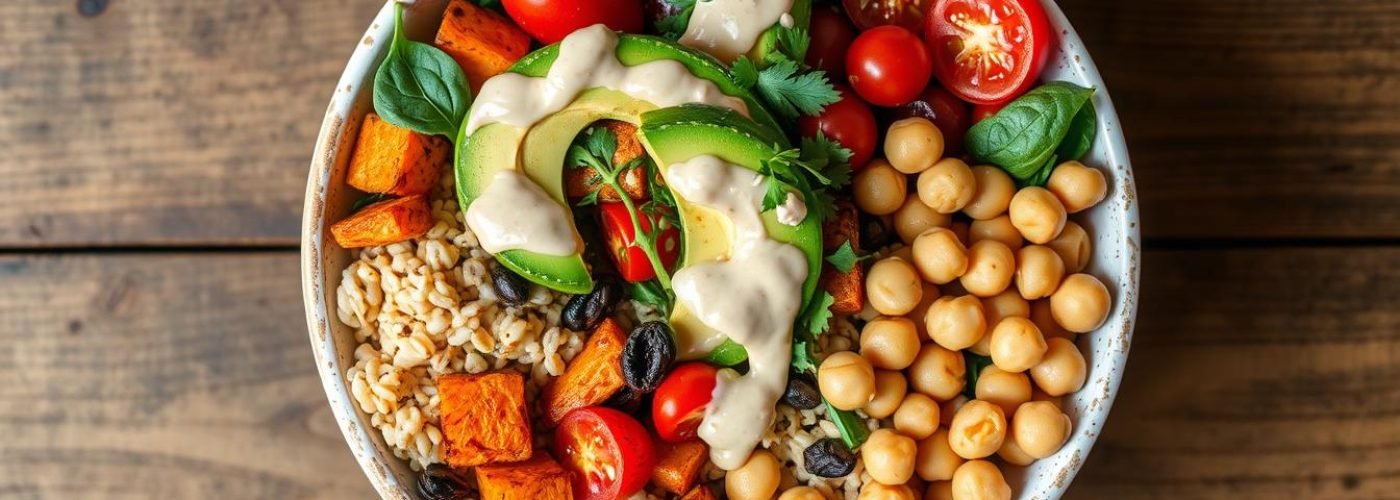Welcome to the vibrant world of the Vegan Buddha Bowl with Tahini Sauce, a delightful plant-based recipe that promises a burst of flavors and nutrients. This healthy meal beautifully combines fresh vegetables, wholesome grains, and protein-packed ingredients, showcasing the very essence of nourishing meals. As you explore this delicious dish, prepare to indulge in not just taste, but also the remarkable health benefits that come with every colorful bite.
Introduction to Vegan Buddha Bowls
The Vegan Buddha Bowl has gained significant popularity as a delicious way to enjoy wholesome meals packed with plant-based ingredients. These bowls typically feature a combination of grains, legumes, fresh vegetables, and vibrant dressings. The name “Buddha Bowl” originates from the idea of a bowl filled to the brim, much like the rounded belly of a Buddha statue, symbolizing abundance and nourishment.
Creating a Vegan Buddha Bowl not only showcases beautiful culinary art but also adheres to various vegan recipes that cater to diverse dietary preferences. This approach promotes mindful eating by encouraging individuals to savor the colors, textures, and flavors of their meal. As a versatile dish, the Buddha Bowl offers endless customization options, making it easy for anyone to whip up a delightful and nutritious meal.
In recent years, the trend of incorporating Buddha Bowls into daily meals has blossomed, aligning perfectly with the growing interest in healthy eating habits. Featuring a variety of ingredients, these bowls emphasize nutrition while delivering on taste and satisfaction, making them a staple for both seasoned vegans and those exploring a plant-based diet.
What Makes a Buddha Bowl Special
Buddha Bowls are beloved for their unique Buddha Bowl features that set them apart from ordinary meals. The vibrant display of colorful produce adds an appealing aesthetic, inviting diners to enjoy every bite. Filled with healthy ingredients, these bowls typically include a balanced ratio of protein, healthy fats, and carbohydrates, ensuring a nutritious and satisfying experience.
Versatility shines as one can customize their Buddha Bowl to suit personal tastes or dietary preferences. Options abound, whether it be adding roasted vegetables, grains like quinoa, or a variety of legumes. Each ingredient contributes to the overall flavor and presentation, making the meal delightful and visually striking.
The amalgamation of flavors and textures creates a feast not only for the palate but for the eyes. The concept of balanced meals embodies the essence of a Buddha Bowl, encouraging individuals to embrace wholesome eating while enjoying a delicious and appealing dish.
Vegan Buddha Bowl with Tahini Sauce
Exploring the myriad of ingredients in a Vegan Buddha Bowl with Tahini Sauce reveals a delightful medley of flavors and textures. Each component not only enhances the dish’s appeal but also contributes significantly to its nutritional profile.
Overview of Ingredients
Essential Vegan Buddha Bowl ingredients include:
- Quinoa
- Chickpeas
- Kale
- Carrots
- Avocados
- Tahini Sauce
These elements combine to create a vibrant and satisfying meal, perfect for any time of day.
Nutritional Benefits of Each Component
These Vegan Buddha Bowl ingredients provide an impressive array of health benefits. For instance:
| Ingredient | Nutritional Benefits |
|---|---|
| Quinoa | High in protein and gluten-free, it’s a complete protein source. |
| Chickpeas | Rich in protein, fiber, and essential vitamins, chickpeas support digestive health. |
| Kale | A superfood packed with antioxidants, vitamins A, C, and K. |
| Carrots | Loaded with beta-carotene, which promotes eye health. |
| Avocados | Provide healthy fats along with vitamins E and C, supporting heart health. |
| Tahini Sauce | Offers healthy fats and protein, enhancing nutrient absorption. |
By incorporating these ingredients into your meals, you maximize flavor while enjoying the incredible Tahini Sauce benefits, including improved heart health and better digestion.
Essential Ingredients for Your Vegan Buddha Bowl
Creating a nutritious and vibrant Vegan Buddha Bowl starts with selecting the right ingredients. The harmony between fresh vegetables, protein sources, and grain options plays a crucial role in making your bowl not only delicious but also balanced.
Fresh Vegetables to Include
Fresh vegetables provide color, flavor, and vital nutrients. Consider incorporating:
- Spinach
- Bell Peppers
- Beets
- Carrots
- Cucumbers
These vegetable choices for Buddha Bowls enhance the overall taste and add essential vitamins to your meal.
Protein-Packed Additions
Protein sources in your bowl ensure you feel satisfied and energized. Popular options include:
- Tofu
- Tempeh
- Chickpeas
- Black Beans
- Lentils
Integrating these protein options supports muscle health and helps maintain a balanced diet.
Grain Base Options
A sturdy base completes your Buddha Bowl. Consider these grain options:
- Brown Rice
- Quinoa
- Farro
- Barley
- Millet
Choosing the right grains adds texture and further amplifies the nutritional profile of your bowl.
Step-by-Step Guide to Preparing the Buddha Bowl
Creating a delicious Vegan Buddha Bowl involves a few simple yet essential Buddha Bowl preparation steps. This guide will share helpful cooking tips, covering everything from preparing fresh vegetables to cooking grains perfectly, along with a tasty tahini sauce recipe for that creamy finish.
Preparation Tips for Vegetables
Properly preparing your vegetables ensures maximum flavor and nutrition. Follow these steps:
- Wash all vegetables thoroughly to remove any impurities.
- Slice veggies into uniform sizes for even cooking.
- Steam or roast them to retain nutrients and enhance flavors.
- Mix raw veggies, like spinach or kale, for a fresh crunch.
Cooking Grains Perfectly
The right texture of grains can elevate your Buddha Bowl. For perfect grains, follow these cooking tips:
- Choose your grain: quinoa, brown rice, or farro work great.
- Use a ratio of two parts water to one part grain for cooking.
- Bring water to a boil, add grains, and then cover and simmer.
- Allow grains to rest after cooking for at least 10 minutes for better texture.
Making the Creamy Tahini Sauce
This tahini sauce recipe is the perfect dressing for your Buddha Bowl:
- In a bowl, whisk together
- 1/4 cup tahini
- 2 tablespoons lemon juice
- 1 garlic clove, minced
- Water to achieve desired consistency
- Add a pinch of salt to taste.
With these tips, your Buddha Bowl will be delicious and visually appealing. Enjoy the process as you create a nourishing meal that is as beautiful as it is satisfying!
| Ingredient | Preparation Method | Cooking Time |
|---|---|---|
| Quinoa | Rinse, then simmer | 15 minutes |
| Broccoli | Steam or roast | 5-10 minutes |
| Carrots | Slice and steam | 5 minutes |
| Chickpeas | Roast or toss raw | 20-30 minutes (if roasting) |
| Tahini Sauce | Mix and whisk | 5 minutes |
Macronutritional Breakdown of the Recipe
Understanding the macronutritional profile of the Vegan Buddha Bowl with Tahini Sauce reveals its potential for contributing to healthy nutrition. This breakdown focuses on the calorie count and the distribution of proteins, fats, and carbohydrates in each serving. This analysis ensures that the body receives a balanced meal while leaning towards higher protein content, which supports a healthy lifestyle.
Calories per Serving
The estimated calorie count per serving of the Vegan Buddha Bowl is approximately 400 calories. This count provides a solid foundation for a nutritious meal, making it easier to manage daily caloric intake.
Assessing the Macronutrient Profile
Incorporating a range of ingredients, the macronutrient analysis of the bowl offers valuable insights:
| Macronutrient | Amount (per serving) |
|---|---|
| Protein | 20 grams |
| Carbohydrates | 50 grams |
| Fats | 15 grams |
This balanced macronutrient profile highlights the importance of each component, supporting the goal of healthy nutrition. The higher protein content helps promote muscle repair and satiety while keeping carbohydrate levels moderate and fats in a healthy range. Emphasizing this balance is crucial for those aiming to maintain energy levels while fitting their macronutrient goals.

Customizing Your Vegan Buddha Bowl
Creating a Vegan Buddha Bowl offers endless possibilities for customization, allowing individuals to tailor each bowl to their own preferences. Whether you want to enhance flavors or boost nutritional value, embracing ingredient substitutions can make a significant difference. Using seasonal ingredients can elevate the dish while supporting local farms and reducing your carbon footprint.
Creative Ingredient Swaps
When you customize your Buddha Bowl, diverse ingredient substitutions can transform the entire experience. For example, consider swapping traditional grains like quinoa with roasted sweet potatoes for a heartier base. Another option includes replacing nuts with pumpkin seeds, which provide a similar crunch paired with a unique flavor profile. Here are a few more creative ideas:
- Substitute brown rice with cauliflower rice for a lighter option.
- Use roasted chickpeas instead of other proteins for added crunch.
- Try zucchini noodles as a pasta alternative, perfect for a refreshing twist.
Adapting for Seasonality
Incorporating seasonal ingredients not only enhances the freshness of your Vegan Buddha Bowl but also encourages sustainability. Local produce often tastes better and is more nutritious due to minimal transportation. During spring and summer, vibrant vegetables like radishes and zucchini shine, while fall and winter feature heartier options such as kale and butternut squash. Here’s a simple guide to seasonal ingredients:
| Season | Vegetable Options | Grain Suggestions |
|---|---|---|
| Spring | Asparagus, Peas, Spinach | Farro, Bulgur |
| Summer | Bell Peppers, Tomatoes, Cucumbers | Quinoa, Barley |
| Fall | Kale, Pumpkin, Brussels Sprouts | Brown Rice, Millet |
| Winter | Beets, Carrots, Sweet Potatoes | Wild Rice, Oats |
Keep exploring ways to customize your Buddha Bowl by using available seasonal ingredients and thoughtful ingredient substitutions. Your culinary adventure will lead to deliciously unique meals every time!
Serving Suggestions and Meal Prep Tips
Creating an inviting and visually appealing Buddha Bowl can elevate your dining experience. The key to good Buddha Bowl assembly lies in balancing colors, textures, and flavors for a harmonious meal. Incorporate a variety of ingredients that are not only nutritious but also eye-catching. Focus on contrasting vibrant veggies, grains, and proteins to make the dish pop. This approach will not only please the palate but also turn meal prep into a fun and creative process.
How to Assemble the Bowl
Start by choosing a base, such as quinoa, brown rice, or farro. Next, layer your favorite proteins like chickpeas, tofu, or edamame. Fill the bowl with an assortment of fresh vegetables, particularly leafy greens, shredded carrots, and sliced bell peppers. To finish, drizzle with tahini sauce or your preferred dressing. Remember, a well-assembled Buddha Bowl should also be Instagram-worthy!
Storing Leftovers Effectively
Proper leftovers storage can extend the life of your hearty meal and maintain the freshness of ingredients. Use airtight containers to keep everything in separate compartments, minimizing sogginess. This method preserves individual textures and flavors for a delightful meal later in the week. Labels can be beneficial for easily tracking meal prep timelines. Follow these tips:
- Cool leftovers to room temperature before sealing.
- Store grains and vegetables separately if possible.
- Consume within 3-5 days for best quality.
With these serving suggestions and meal prep strategies, you can take your Vegan Buddha Bowls to the next level, enjoying nourishing and delicious meals throughout the week.
Health Benefits of Eating Vegan Buddha Bowls
Vegan Buddha Bowls offer a myriad of health benefits, making them an excellent choice for those seeking to enhance their diet. Incorporating a variety of vegetables, legumes, and grains, these bowls provide an impressive array of nutrients, amplifying the health benefits of plant-based meals.
Boosting Nutrient Intake
One primary advantage of Vegan Buddha Bowls is their ability to enhance nutrient density within meals. Packed with colorful vegetables, each bowl is a vibrant source of vitamins, minerals, and antioxidants. For instance, vegetables like kale and sweet potatoes contribute significantly to the overall nutrient profile, supporting immune function and skin health. Legumes provide essential proteins and fiber, promoting digestive health while ensuring that every bite maximizes nutrient intake.
Staying Energized with Plant-Based Meals
Plant-based meals, particularly Vegan Buddha Bowls, serve as effective energy-boosting foods. The combination of whole grains, healthy fats, and high-quality proteins creates a balanced meal that sustains energy levels throughout the day. Ingredients such as quinoa and chickpeas offer complex carbohydrates, providing lasting energy without the crash associated with processed foods. Consuming these wholesome meals can lead to improved physical performance and increased focus.

Why Tahini Sauce is a Must-Have
Tahini sauce stands out as a vital component in the Vegan Buddha Bowl, adding layers of flavor and nutrition. Its creamy texture and deep, nutty essence enhance the overall dish, making it a key player in the sauce flavor profile.
Flavor Profile and Versatility
The rich, complex flavors of tahini can elevate a simple bowl into a delightful culinary experience. This versatile sauce pairs beautifully with various ingredients, providing a luscious creaminess that complements fresh vegetables, grains, and plant-based proteins. Whether used as a drizzle or a dressing, tahini’s unique characteristics enhance the taste of any meal.
Health Benefits of Tahini
Incorporating tahini into your diet offers numerous tahini sauce benefits. Rich in essential nutrients, tahini is an excellent source of calcium, magnesium, and protein, making it an ideal component for anyone following a plant-based lifestyle. Its healthy fats contribute to overall heart health while promoting a feeling of fullness, preventing overeating and aiding weight management.
| Nutrient | Amount per 2 tablespoons |
|---|---|
| Calories | 178 |
| Protein | 5g |
| Calcium | 128mg |
| Fat | 16g |
| Carbohydrates | 6g |
Final Thoughts on Creating a Delicious Buddha Bowl
Preparing a Vegan Buddha Bowl with Tahini Sauce is not only an enjoyable culinary experience but also a celebration of healthy eating. The versatility of this dish allows for a wide range of ingredients, empowering you to tailor it according to your personal taste and nutritional needs. Whether you want to load up on fresh vegetables or include your favorite protein-packed additions, the options are plentiful.
As you embark on this journey of plant-based cooking, consider these Buddha Bowl creation tips: experiment with different grains like quinoa or brown rice, and don’t shy away from seasonal veggies that enhance flavors. The goal is to create a delightful blend that not only appeals to your palate but also contributes to your overall well-being. After all, these delicious vegan meals are a perfect addition to any healthy eating regimen.
Ultimately, the journey to creating a nourishing Vegan Buddha Bowl is rewarding. With each unique bowl, you’re making a choice to celebrate flavors and nutrition in a vibrant way. So gather your ingredients and get creative—this versatile dish is a canvas for your culinary art!

